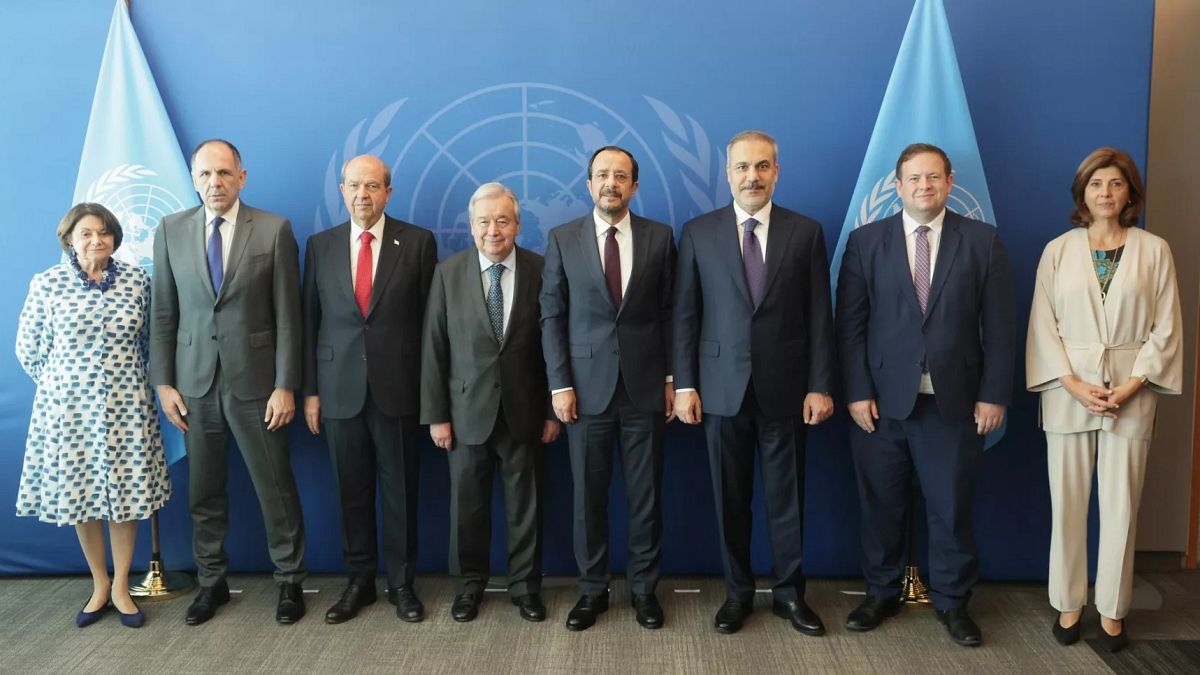Published on
•Updated
Five-party negotiations on the Cyprus problem concluded on Thursday without resolving key disputes. However, participants agreed to continue discussions under the guidance of the UN.
The informal talks between Greek Cypriot President Nicos Christodoulides, Turkish Cypriot leader Ersin Tatar, and representatives from Greece, Turkey and the UK produced no agreement on reopening crossing points between the island’s two parts.
UN Secretary-General Antonio Guterres has scheduled additional meetings for September.
“We are seeing small but significant progress, step by step, towards the major goal which is the resumption of talks and the resolution of the Cyprus problem,” Christodoulides said after the meeting.
Guterres confirmed that four of six measures agreed in Geneva in March — establishing a technical committee on youth issues, environmental and climate change initiatives, cemetery rehabilitation, and a de-mining agreement, which is awaiting final technical details — have been implemented.
Crossing points remain an issue
Two measures remain unresolved: opening four transit points and installing solar power in the buffer zone. The crossing points remained the key issue, with Guterres making what officials described as significant efforts to reach an agreement.
“There are very different views on both sides with regard to the solution of the Cyprus problem, but I think we are building, step by step, trust and creating the conditions to do concrete things for the benefit of the Cypriot people,” Guterres said.
Greek Cypriots accepted Turkish Cypriot proposals to open crossings at Mia Milia and Louroutzina, but received no response regarding other proposed routes, Christodoulides said. Discussions on opening a crossing from Athienou to Aglandjia stalled when Turkish representatives stated that they needed to consult with Turkish military officials.
The talks produced three new measures: establishing an advisory body for civil society participation, exchanging cultural artefacts and monitoring air quality while addressing microplastic pollution.
Greek Foreign Minister George Gerapetritis called the discussion “extremely productive,” but that negotiations had been dormant for eight years since the failed Crans-Montana talks.
“It is extremely important that the Cyprus problem is now at the top of the agenda of the UN Secretary General, who has appointed a personal envoy,” Gerapetritis said.
A trilateral meeting between Christodoulides, Tatar and Guterres is scheduled to take place in September during the UN General Assembly. Another five-party meeting is planned for after the elections in Turkish-controlled northern Cyprus in 2025.
UN secretary-general’s personal envoy Maria Angela Holguin will continue working on the crossing points issue between meetings.
Christodoulides also met privately with Turkish Foreign Minister Hakan Fidan for nearly an hour after the dinner on Wednesday.
“Today we did not hear anything different from Turkey’s well-known public statements,” Christodoulides said of the broader talks.
Cyprus has been divided since 1974 when Turkey occupied the northern third of the island following a coup attempt. The Republic of Cyprus which encompasses the southern two-thirds of the island is internationally recognised and an EU member state, while the breakaway entity in northern Cyprus remains recognised only by Turkey.
The UN has maintained a peacekeeping force in Cyprus since 1964.

